
A Surgeon’s Tale from Norfolk to Malvern
In the annals of medical history, the story of Frederic Bell, often recorded as Frederick, is one of quiet dedication and personal tragedy. Born in 1812 in Tilney St Lawrence, Norfolk, England, he was christened on the 29th of December that year in the neighbouring Terrington St. Johns. His gravestone in Great Malvern, however, records his birth six years later, in 1818, a discrepancy that remains a small mystery in the larger narrative of his life.
A Family of Medical Practitioners
Frederic was one of six children born to William Bell, a surgeon, and his wife, Sarah Coates, alongside siblings Danderson, Charlotte, Ann, Edward, and William. The family environment was no doubt charged with discussions of health and science, which influenced Frederic’s future vocation.
Medical Journey
At the age of 15, Frederic’s name appears on a confirmation list by the Bishop of Chichester, hinting at his early inclination towards a life of service. His journey to becoming a surgeon was marked by his graduation from Apothecaries’ Hall in 1835, a significant milestone that set him on his professional path.

By 1844, he was serving as a surgeon at the Wickham Market workhouse, providing care for the impoverished in a facility designed to house hundreds.
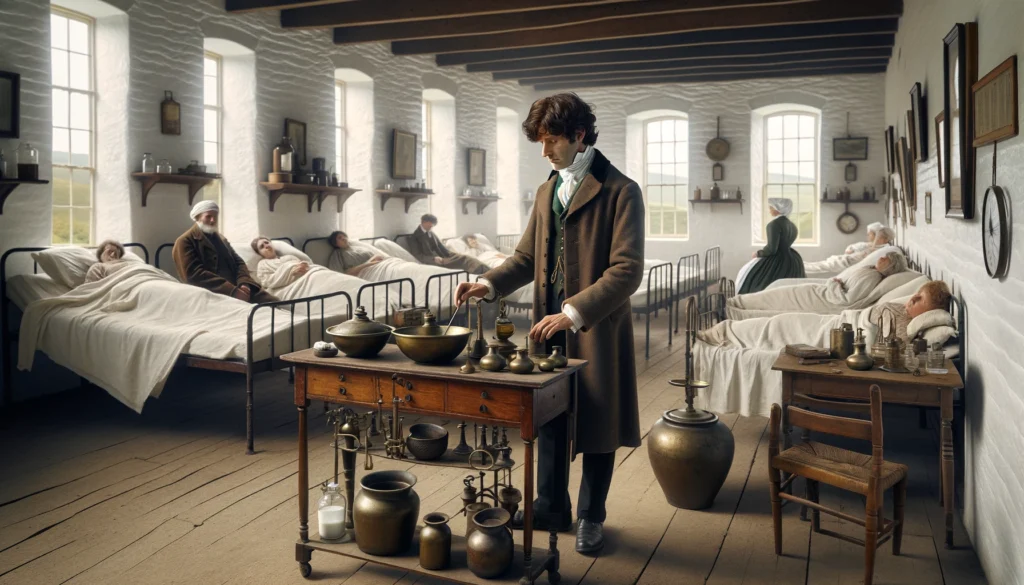
Infirmary at Wickham Market workhouse
His commitment to the poor is evident in his work at the Plomesgate Union Workhouse, where he was listed among several surgeons responsible for the wellbeing of numerous of inhabitants across numerous parishes.
Pioneering Professional Work
Frederic’s name is also connected to the early use of ether in surgical procedures. An extract from a letter published in the Ipswich Journal praised his successful use of the anaesthetic during surgery to amputate an injured factory worker’s arm at the shoulder, in Leiston, where he was known as a dedicated surgeon.
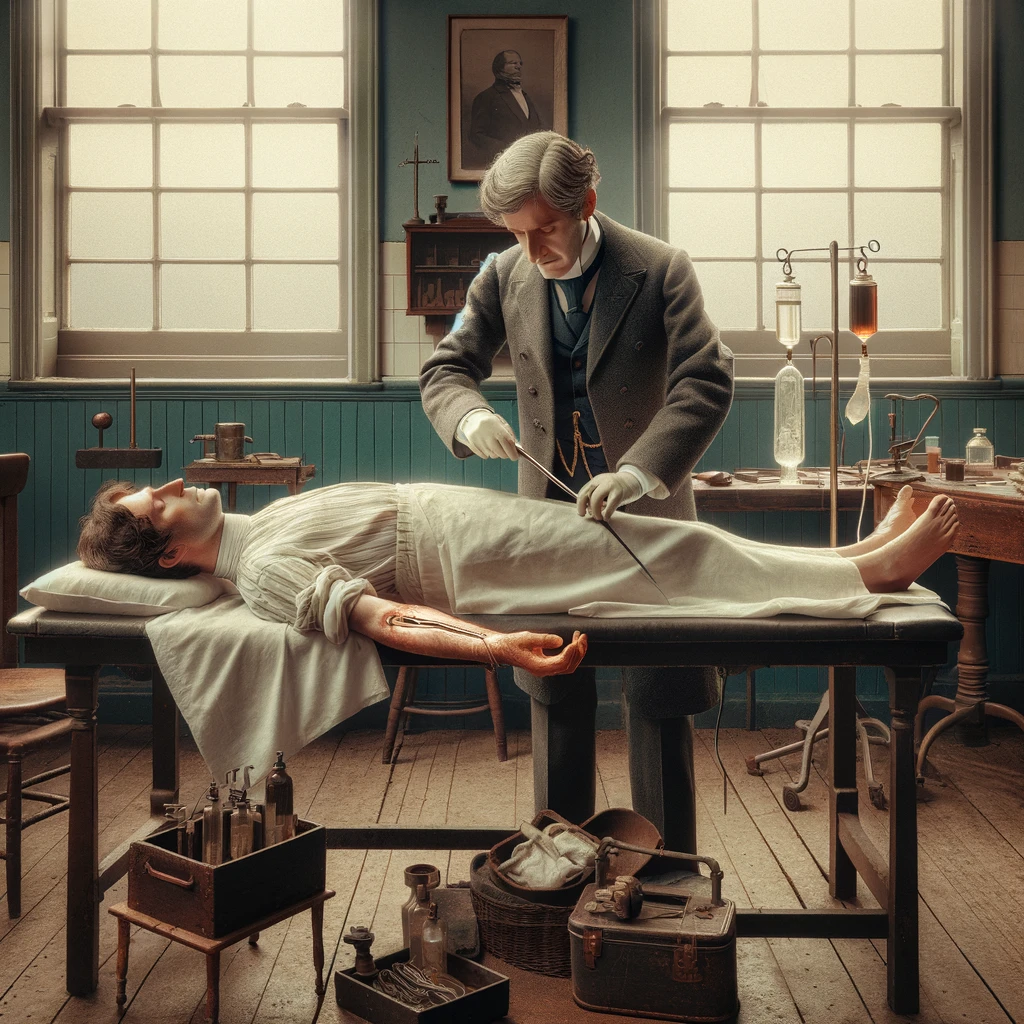
Personal Life and Legacy
While Frederic never married, according to family lore he had a relationship with Emma Smyth (a domestic servant), who bore him a son, James Thomas (later James Thomas Hillen, having adopted his stepfather’s surname).
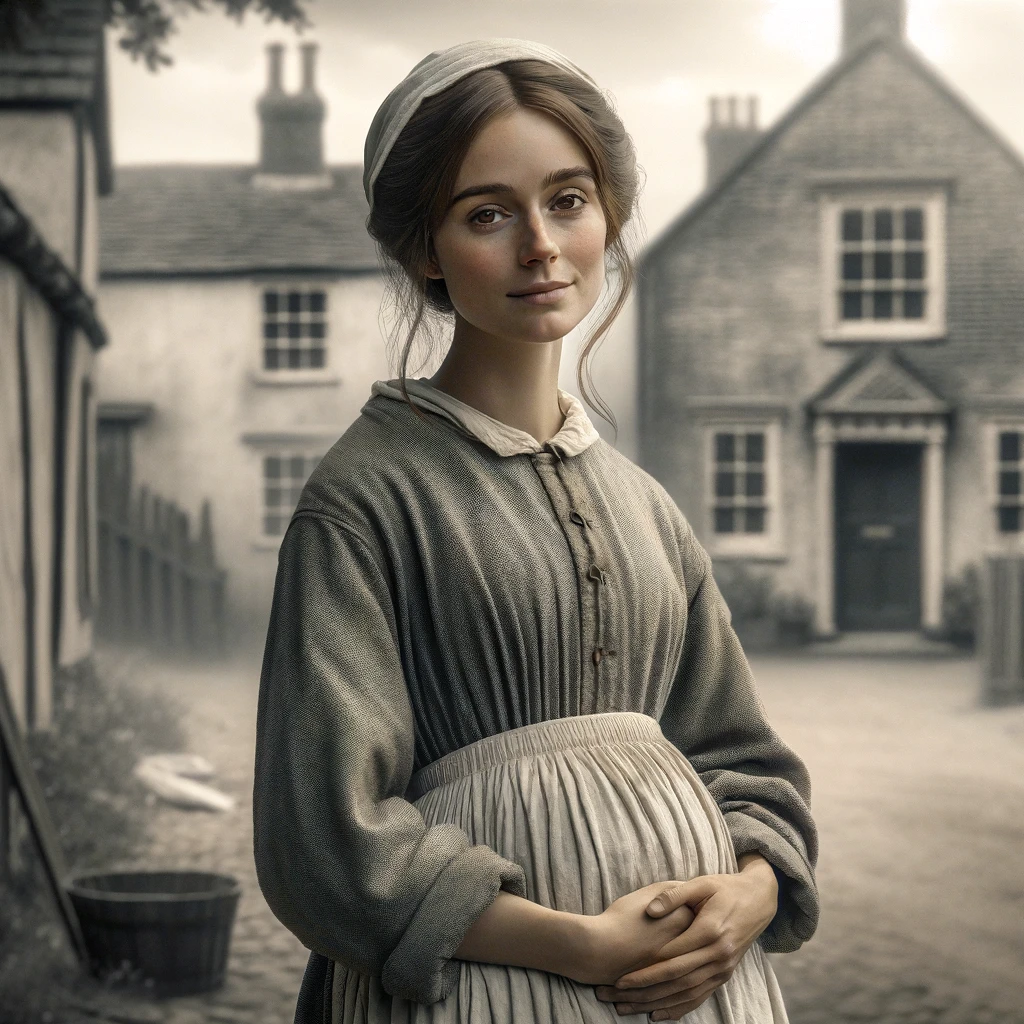
His life in Terrington St. John, London, and Aldeburgh paints a picture of a man deeply engaged with his community.
Tragic End

Frederic had been seeking respite in Great Malvern, a place known for its water cure treatments, which were considered revolutionary at the time. His close friend, Newson Garrett (mayor of Aldeburgh and father of Britain’s first female physician, Elizabeth Garrett Anderson) accompanied him to Great Malvern
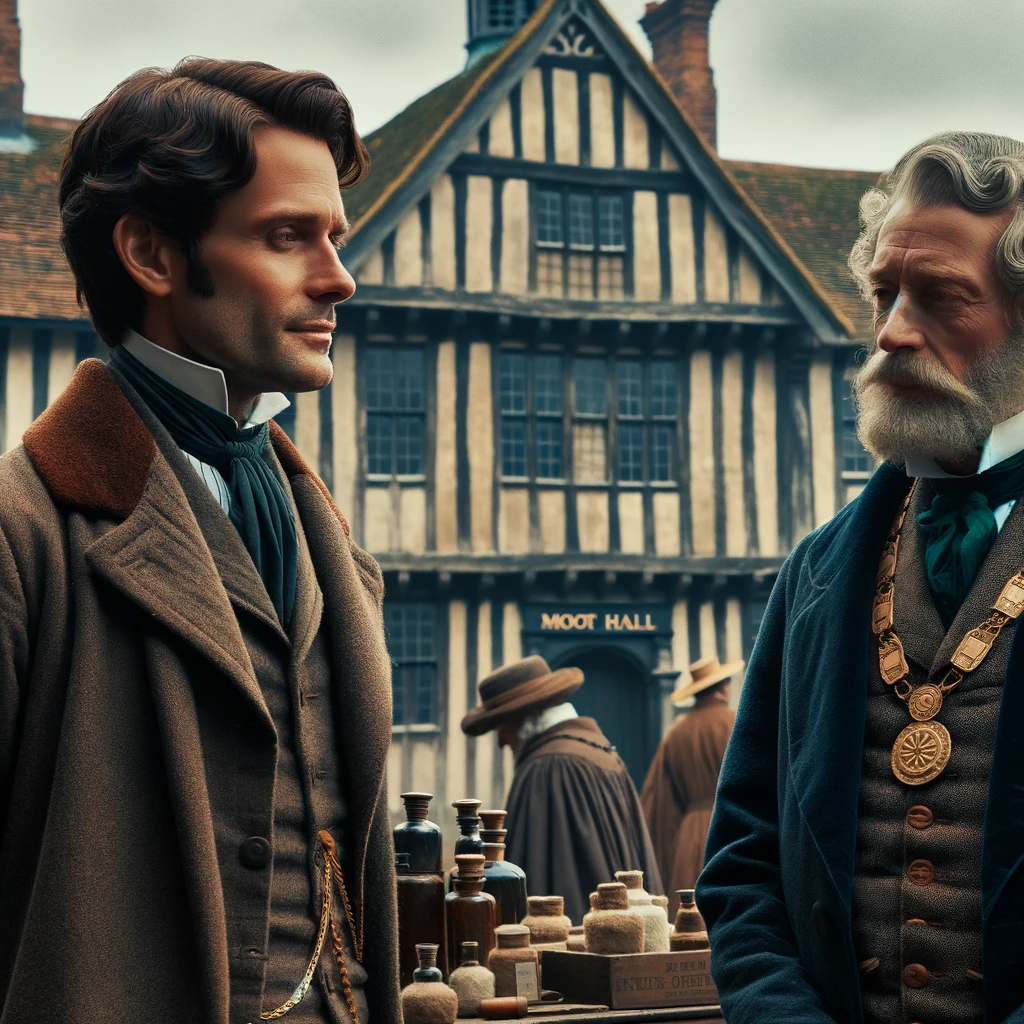
Frederic’s life came to a tragic end on 15th July 1860 at Tudor House, Malvern. A newspaper report detailed the sad circumstances of his suicide, attributing it to an “overworked brain.”
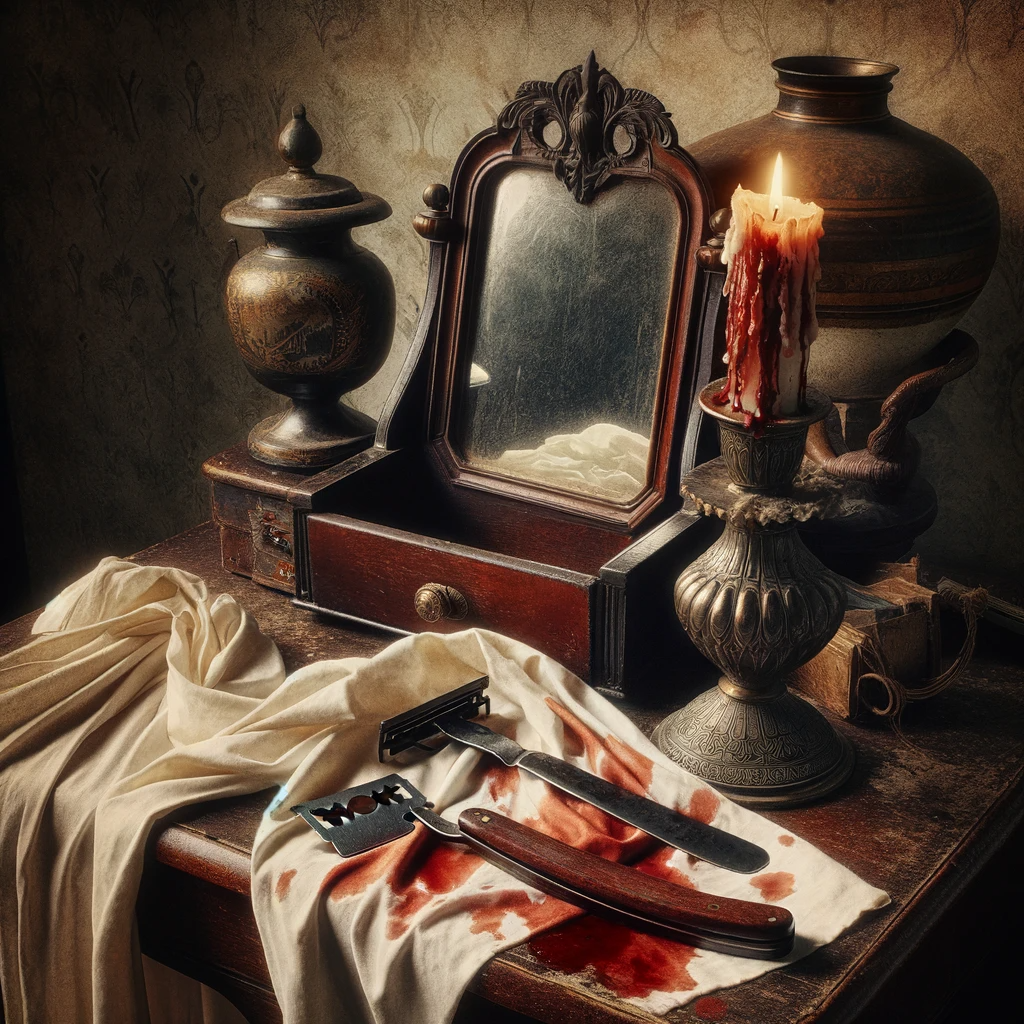
Newspaper report of his death
Extract from the Ipswich Journal, and Suffolk, Norfolk, Essex, and Cambridgeshire Advertiser, Saturday, July 21, 1860.
ALDEBURGH.
SHOCKING SUICIDE. – It is our painful duty to record a shocking case of self destruction, in the person of F. Bell, Esq., the well known and much respected surgeon of Aldeburgh. The sad occurrence took place at Malvern, Worcestershire, whither the deceased had gone for the benefit of his health. We extract the following particulars from the “Malvern Journal” of Wednesday last. From the accounts given of Mr. Bell by parties residing at Malvern, who had known him for a period of twenty years, it appears that he has been very assiduous in aiding institutions having for their object the improvement of the position of the working classes, and he has latterly devoted much time and attention in lecturing and praying to these classes, and more widely spreading a knowledge of the scriptures. To this, coupled with overworking at his profession, it would seem, must be attributed the cause of the shocking and untimely end that he has, by his own hand, come to. This overtaxing of his brain had produced mental depression, and for some time past he has been unable to take any food unless it was of necessity administered to him by force by his friends. To relieve him from this state it was determined that he should come to Malvern, and he accordingly arrived here in company with a friend, Mr. Garrett, of Aldeburgh, on Monday evening, the 9th inst. He went direct to Tudor House, and placed himself under the skilful treatment of Dr. Gully and Dr. Badgley. The treatment he received was so far successful that by Wednesday an improvement was manifest, and he continued progressing favourably until the time he was last seen on Saturday night. In fact, it was so manifest that on Saturday he joined in conversation at the dinner table, and also, while watching a game of billiards, offered to act as marker for the players.
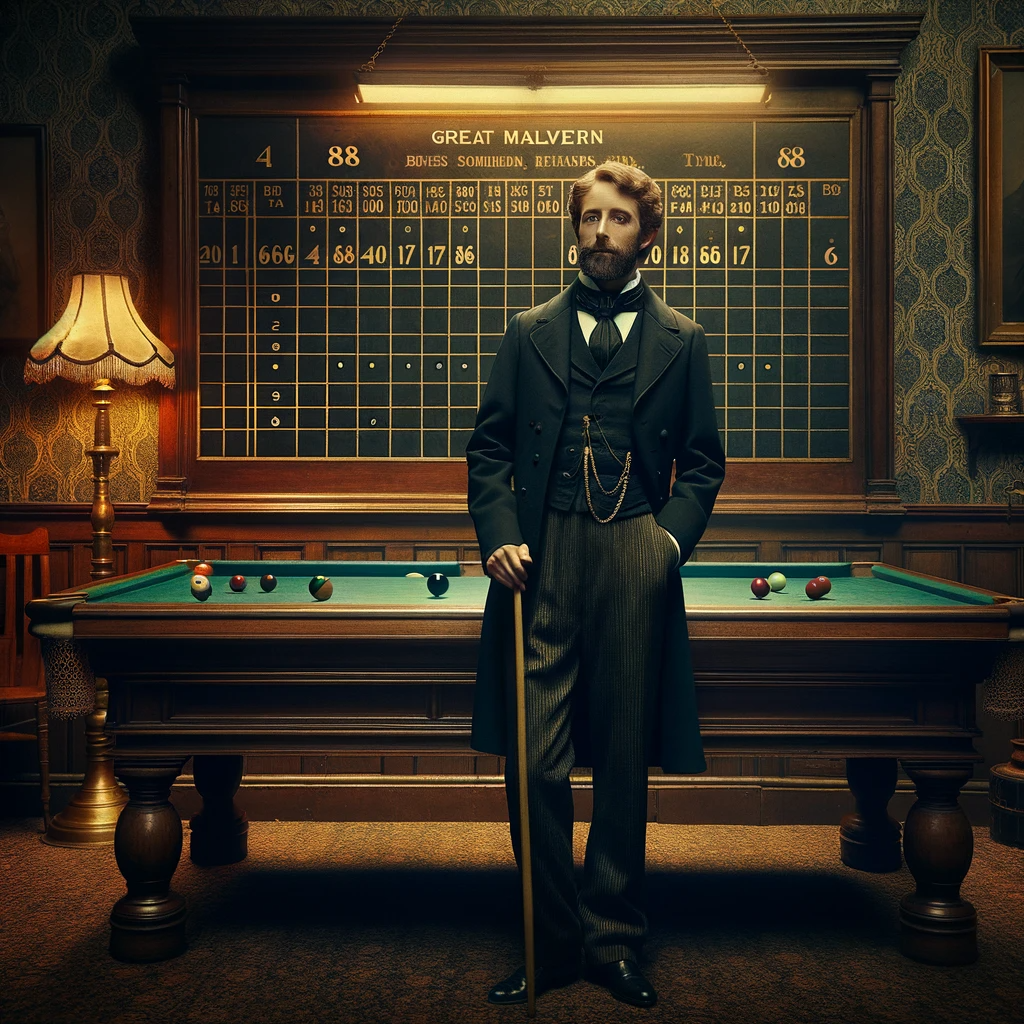
He went upstairs to his apartment about half-past nine o’clock at night, and after being fomented by the bathman, thanked him in his usual meek and gentlemanly manner for his attendance upon him, and remarked that he felt sleepy, and hoped that he should have a good night’s rest. The bathman then wished him good night, and left the room. At about half-past six the next morning, Shaw (the bathman) went to his room, fully expecting to find Mr. Bell comfortably in bed, instead of which, however, a scene of a most horrifying nature met his view. The articles on the dressing table were literally smothered with blood, and on the floor lay prostrate, surrounded with blood, the lifeless body of one whom he had only left eight hours previously apparently in good spirits, and progressing from the malady which affected him. He called in another bathman, but soon discovered that the patient was no more. Dr. Badgely was at once acquainted with the melancholy occurrence, and was instantly in attendance, but human aid was no longer required, as the vital spark had fled. From the position of the body when found the following morning, it is conjectured that the deceased gentleman had deliberately arisen from his bed, relit the candle that had been placed on the mantleshelf (but was found next morning on the left side of the looking glass) had taken off his night-shirt, and then had taken up his razor, and inflicted upon his throat a wound that caused almost instantaneous death. At the inquest held upon the body, the journal returned a verdict “that the deceased cut his throat while in an unsound state of mind.”
in memory
The following tablet was erected in the Aldburgh parish church of St Peter and St Paul. It reads Sacred to the memory of Frederic Bell Esq. Surgeon of this place who died suddenly at Great Malvern in Worcestershire on the 13th of July 1860. Much respected and ever most deeply lamented. “Them which sleep in Jesus will God bring with him” “By him all that believe are justified from all things, from which ye could not be justified by the law of Moses” “Wherefore comfort one another with these words”. This tablet is erected by a few friends in token of affectionate memory.
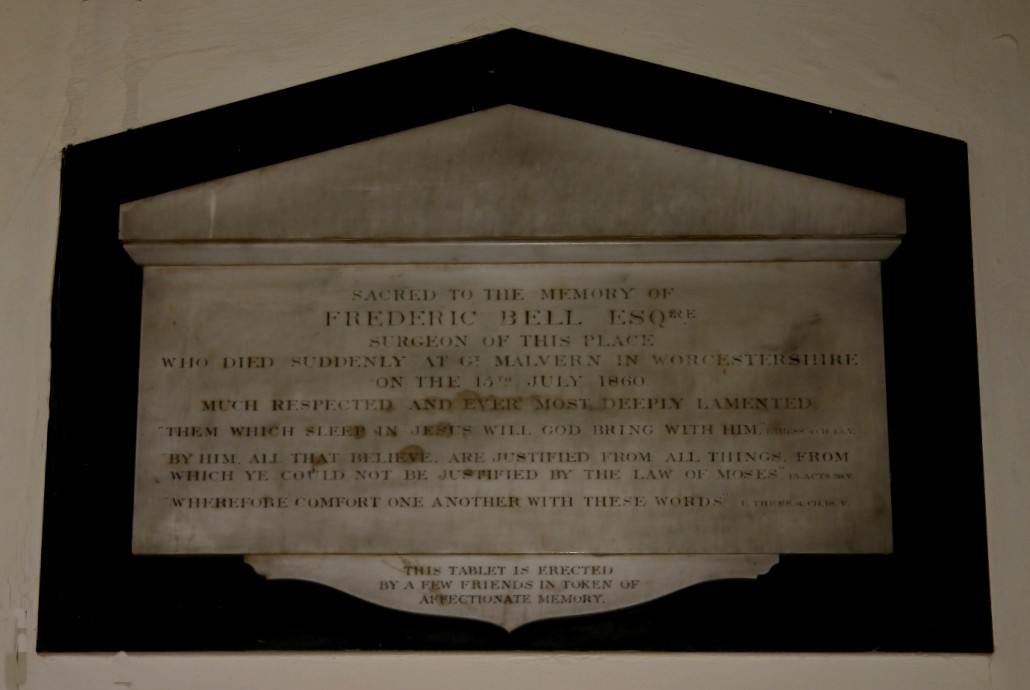
The inscription on Frederic’s gravestone speaks to his character: “Amiable, gifted, humane, gentle, affable and mild, his highest object was to lead the minds of his fellow creatures to their saviour and their god. While attending to his professional duties with kindness and zeal. Verily there is a reward for the righteous. Promptus sum (the Bell family motto). E.B. (presumably his brother, Edward Bell)” .
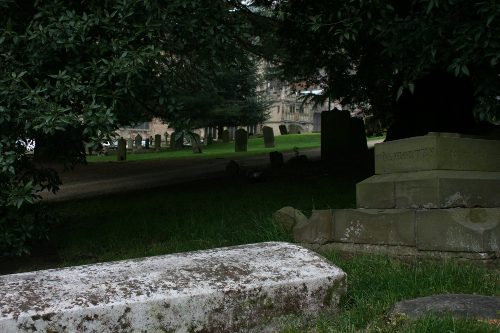
Frederic’s grave in the churchyard at Great Malvern Priory
There is also an image of the Bell family crest with the motto ‘Promptus Sum’, bearing Frederic’s name:
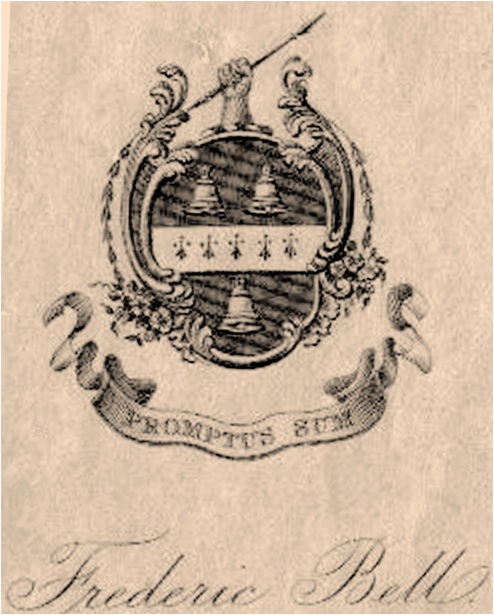
His will, discovered in recent years, further highlights his generosity and thoughtfulness, leaving bequests to his servant, family, and the Aldeburgh public reading room and library:
‘This is the last will and testament of me, Frederic Bell, Aldeburgh, Suffolk, Surgeon. I direct that all my just debts funeral and testamentary expenses be first paid. I bequeath to my old and faithful servant Elizabeth Pettit £100, if she should be living at my decease. I bequeath to my nephew George Coates Bell MD, in Indian Army, my silver tray, my glass butter dish with silver top and stand, My ring engraved with my crest, Sundry family portraits, and all my surgical and medical books. I bequeath to my nephew, Claudius William Bell, Indian Civil Service, All other plate jewellery, china, I may possess at my decease. I direct my practice to be disposed of by my executors. I direct whatever landed house or personal property I may have to be sold which with any money or securities I may be in possession of at my decease, proceeds from these several sources to be subject to the legacy above-named to Elizabeth Pettit, if living, and all legal claims, I direct my executors to invest the residue in government securities. The interest of which to be given to my sister, Charlotte Bell now in Canada West, during her lifetime and that after her decease the principle be given to my niece Mary Jane Bell daughter of my late brother Danderson Coates Bell (formerly surgeon in the Honourable East India Company Service). Out of my personal effects, I bequeath all my books excepting medical and surgical ones to the trustees of the Aldeburgh public reading room and library for the use of the room. I hereby nominate and appoint Newson Garrett of Aldeburgh Suffolk, merchant and James Southwell of Saxmundham Suffolk, Solicitor. Executors of this my last will and testament and each of which I wish to have a mourning ring. I declare this to be my last will and testament, in witness whereof I have to this one and only sheet of paper set my hand and seal this first day of June 1859. Signed Frederic Bell, signed sealed published and declared by me the said testator Frederic Bell as and for my last will and testament in the presence of us who at his request and in his presence and in the presence of each other have hereunto subscribed our names as witnesses. Witness Charles Pope James, surgeon, Aldeburgh. Thomas Allen Hayes, surgeon, Leiston. Testator died 15th July 1860 proved 3rd of September 1860 by Newson Garrett and James Southwell+ the executors. Effects under £1500. Examined and signed by H. Chamberlain’
Conclusion
Frederic Bell’s life story is a poignant reminder of the pressures faced by medical professionals, even in the 19th century. His dedication to his patients, his advancement of medical practices, and his untimely death all contribute to the legacy of a man who lived with the aim of easing the sufferings of others, driven by a passion for healing that ultimately took a toll on his own well-being.
Various newspaper articles mentioning Dr Frederic Bell
Image © THE BRITISH LIBRARY BOARD. ALL RIGHTS RESERVED.
Bury and Norwich Post – Wednesday 28 August 1839
Image © THE BRITISH LIBRARY BOARD. ALL RIGHTS RESERVED.
TO THE
Nobility, Clergy, Gentry, and the Public in general.
THOMAS GOWER
Most respectfully returns his sincere thanks for the kind patronage he has received for his
NEWLY INVENTED
CONCENTRATED
PURE LEMONADE. &c.
And now begs to inform them that several eminent Physicians and Surgeons of the Town and Neighbourhood have favoured him with the following
TESTIMONIAL:-
We have used the CONCENTRATED PURE LEMONADE, prepared by Mr. THOMAS GOWER, and have no hesitation in recommending it as a valuable acquisition to the Chamber of the Invalid, as well as a refreshing and cooling beverage to those in health.
Sir L. Maclean, M.D. Sudbury
Andrew Wood Baird, M.D. Ipswich
George D. Lynn, M.D. Woodbridge
George Probart, M.D., Bury St Edmund’s
W.B. Clark, M.D., Ipswich
John Bailey, M.D., Ipswich
James Owen, M.D., Ipswich
James Paterson, M.D., Downham
George Green Sampson, Surgeon, Ipswich
Alex. Henry Bartlett, Surgeon, Ipswich
C.C. Hammond, Surgeon, Ipswich
G.K. Cowell, Surgeon, Ipswich
J.O. Francis, Surgeon, Ipswich
W.T. Image, Surgeon, Bury St. Edmund’s
William Welton, Surgeon, Woodbridge
T.G. Wales, Surgeon, Downham
John Roberts, Surgeon, Brandon
T. Gissing, Surgeon, Woodbridge
F. Bell, Surgeon, Aldborough
THOMAS GOWER’S
NEWLY INVENTED
CONCENTRATED PURE LEMONADE,
Made in the short space of One Minute.
Put a Table Spoonful of the Concentrated Lemonade to a tumbler of cold water, or mix to the palate, stirring it up well from the bottom of the glass, and it will, on account of the purifying process which the Lemon Juice and Sugar undergoes, become as colourless as water, and will be found a cool, wholesome, and delicious beverage, either in the ball-room, parlour, or in the chamber of the Invalid, to whom it is particularly recommended. Sold wholesale for Ready Money, at T. GOWER’s La Veritable Curaçao and Concentrated Punch Manufactory, Trafalgar Buildings, Shire Hall Yard, Ipswich, Suffolk.
Retail Price – In Bottles., 2s 6d and in Wine Bottles 5s each. Bottles and hampers to be charged and allowed for when returned.
To be had of all Chemists, Confectioners, &c.
The SUFFOLK CHRONICLE; Or, Ipswich General Advertiser, and County Express.
No. 1919
Saturday, January 30, 1847.
To the Editor of the Suffolk Chronicle.
SIR. – Allow me, through the medium of your Chronicle, to make known to the public, that the newly-discovered agent for mitigating the pain of surgical operations, was successfully employed by Mr. Bell, surgeon of Aldeburgh, on Saturday last. I was present at, and assisted him in the operation.
A young woman, 23 years of age, having many years suffered from a scrofulous disease of the knee joint (tuberculous arthritis, a condition where tuberculosis affects the knee joint), had the limb amputated while under the influence of the inhalation of sulphuric ether, and was quite unconscious of pain.
To alleviate pain during a severe operation, to which suffering humanity is often compelled by dire necessity to submit, is always the study of the surgeon; and a discovery like the present, is a subject of such intense public as well as professional interest, that every surgeon who tries this potent agent ought to give publicity to the result, that confidence may be given to those suffering under disease, and also a scientific truth disseminated amongst the profession.
I am, Mr Editor
Your obedient servant,
Henry L. Freeman, MRCS.
Saxmundham, 28th Jan 1847
Image © THE BRITISH LIBRARY BOARD. ALL RIGHTS RESERVED.
The Ipswich Journal – Saturday 07 June 1851
Desirable House Property,
In the Bathing Town & Port of Aldeburgh,
AND COTTAGES,
In Knoddishall & Leiston, Suffolk.
To be SOLD by AUCTION,
By Mr. S. FLICK,
At the Cross Inn, Aldeburgh, on Monday, the 23rd day of June instant, at Four o’clock in the afternoon,
IN TEN LOTS
…Lot 4. Comprises a new brick and tile sash fronted MESSUAGE (a brick-built house with a tiled roof, featuring sash windows at the front. “Messuage” is an archaic legal term referring to a dwelling house along with its outbuildings and adjacent land. This description suggests a residential property typical of the Victorian era, known for its solid brick construction, tiled roofing for durability, and sash windows, which were a popular window style during that period), very pleasantly situated at the entrance of the town, comprising entrance hall, two parlours, surgery, good kitchen, store-rooms, wash-house, and three sleeping-rooms, three-stalled stable, and other outbuildings, now in the occupation of F. Bell, Esq., Surgeon.
The Ipswich Journal – Saturday 31 December 1842
ALDEBURGH – On the 26th inst., a dinner was provided at the Lion Hotel, for the benefit of Mrs. Nunn, the respectable proprietor of that establishment, for some years ably conducted by her late husband. There were about 100 gentlemen and tradesmen present. The chair was occupied by the Hon. Arthur Thelluson, Vice-chairman Mr. Newson Garrett. Amongst the company were John Kendall, Esq. John Underwood, Esq., Collector of Customs; H. Southwell, John Symons, Fredk. Bell, Esqrs, Lieut. Hill, R.N., R. Mayhew, Esq., Messrs. Richd. Garrett, John Cooper, Jas. Osborne, Wm. Last, Thomas Wainwright, G.M. Tyrrell, W. Garrard, &c., &c. The company were much gratified by the excellent arrangements and the plentiful supply of all that was needful to render the dinner comfortable and respectable. Appropriate toasts were proposed by the Hon. Chairman and Vice-president and speeches delivered by several others in the company, who separated much pleased with the evening’s entertainment. Mr. Newson Garrett also kindly entertained, with an excellent dinner, about 25 of his sailors at the same hotel.
The Ipswich Journal – Saturday 05 August 1848
Aldeburgh …. Agent: Mr. James Osborne Medical Officer: F. Bell, Esq.
The Suffolk Chronicle; or Weekly General Advertiser & County Express. – Saturday 24 November 1849
ALDEBURGH, Nov. 23
The Corporation of this Borough on Saturday elected nine Burgesses to fill the vacancies of Councilmen, viz. the Rev. – James, Messrs. N. Garrett, W. Garrard, J. Beart, J. Neeve, – Easter, F. Bell, and R. Gorham.
Image © THE BRITISH LIBRARY BOARD. ALL RIGHTS RESERVED.
The Suffolk Chronicle; or Weekly General Advertiser & County Express. – Saturday 18 April 1846
ALDEBURGH, April 17
On Tuesday last, the gentlemen, merchants, and tradesmen, of this town, met at the Church to transact the usual business of the parish, when a vote of thanks was unanimously presented to the Hon. Arthur Thellusson, for the faithful, kind, and efficient manner in which he (in conjunction with Mr. Jas. Osborne, sen.) had discharged the duties of Churchwarden during the past year; in addition to which, the meeting had to tender their gratitude for the very handsome present of the above Hon. Gentleman, of a large and valuable silver plate for the communion service at Aldeburgh Church. John Barker, Esq., and Mr. James Todd were unanimously chosen Churchwardens for the ensuing year. After the business was transacted, the company adjourned to the White Lion Hotel, where an excellent dinner was provided by Mrs. Nunn, the proprietor, who is always anxious to please, and who is well qualified to provide for such occasions. The Hon. A. Thellusson presided, and the Rev. H.T. Dowler, the worthy Vicar, John Barker and F. Bell, Esqrs., surgeons, Messrs. Newson Garrett, Jas. Neeve, Jas. Osborne, Wm. Garrard, and many others of the town participated in the pleasures of the evening, in the course of which many observations were made relative to the improvements recently made in this enchanting and justly-celebrated watering place. The opening of the new rail-road from Ipswich to London, which it is hoped will soon be completed, doubtless will induce many families to visit us from the metropolis during the summer season. Any information in reference to lodging-houses may be obtained, free of charge, from Mr. Lincoln, at the Aldborough Library, who will feel much pleasure in procuring houses for any person or family who require accommodations. Several improvements are now in progress, and the beautiful promenade is in order again, after the clearing away of the pebbles which were thrown over it during a very high tide in the winter.
The Suffolk Chronicle; or Weekly General Advertiser & County Express. – Saturday 24 April 1858
Image © THE BRITISH LIBRARY BOARD. ALL RIGHTS RESERVED
REPRESENTATIVE MEN OF AMERICA
A lecture was delivered at the Reading Room, Aldborough, on Friday evening, April 16th, on the above subject, by the Rev. Edward Mathews, of the United States. The chair was takan by F. Bell, Esq., surgeon, who introduced the lecturer in an able speech. The Americans were the offspring of England; there were elements of weakness and strength in their national character; and their influence on the future of other nations would, undoubtedly, be very great; and while it was the duty, it was also the interest of Englishmen to become fully informed respecting them. Mr. Mathews, who had resided many years in America, was prepared to furnish information on the subject, which would, he had no doubt, be received with gratification by the audience.
[speech about slavery and the political setup in the USA]
A vote of thanks was accorded to the lecturer and to the chairman for his kindness in presiding, and the meeting separated.
Framlingham Weekly News – Saturday 10 November 1860
Image © THE BRITISH LIBRARY BOARD. ALL RIGHTS RESERVED.
ALDEBURGH
The sale of the effects of F. Bell, Esq., surgeon, took place on the 30th ult. The same evening the Practice was offered for competition at the White Lion Hotel and was purchased by Theodore Grant Cresy, Esq., who comes to Aldeburgh, we understand, with testimonials of the highest character.
Framlingham Weekly News – Saturday 21 July 1860
Image © THE BRITISH LIBRARY BOARD. ALL RIGHTS RESERVED.
ALDEBURGH
We have to lament the death of F. Bell, esq., for many years surgeon at the above place, who died very suddenly at Malvern, in Worcestershire.
The Ipswich Journal – Saturday 04 August 1860
Image © THE BRITISH LIBRARY BOARD. ALL RIGHTS RESERVED.
ODD FELLOWS. – N.F. Kell, Esq. surgeon, has been appointed surgeon to the M.U.I.O. of Odd Fellows, to fill the vacancy occasioned by the death of F. Bell, Esq.
The Ipswich Journal – Saturday 31 December 1859
Image © THE BRITISH LIBRARY BOARD. ALL RIGHTS RESERVED.
ALDEBURGH PETTY SESSIONS.
WEDNESDAY. – Before the Rev. H.T. Dowler, chairman: Newson Garrett and F. Bell, Esqrs.
Serious charge against a Naval Officer. – Captain J. E. Risk, R.N. commanding officer of the Coastguard of this district, was charged with assaulting George Cable, one of the crew of the Lifeboat, on the occasion of the late fatal disaster.
Bury and Norwich Post – Tuesday 18 October 1870
Image © THE BRITISH LIBRARY BOARD. ALL RIGHTS RESERVED.
On the 16th inst, at Aldeburgh, CHARLOTTE, sister of the late FREDK. BELL Esq., surgeon.
Norfolk Chronicle – Saturday 22 October 1831
Image © THE BRITISH LIBRARY BOARD. ALL RIGHTS RESERVED
MARRIED
Thursday last, at Griston, by the Rev. Walter Chenery, Mr. Wm. Bell, of Walpole, son of the late Mr. William Bell, surgeon, of Terrington St. John’s, near Lynn, to Mary, third daughter of Mr. Land, of the former place.
[NOTE: Walpole is near Halesworth, in Suffolk, not too far from Aldeburgh]
Norfolk Chronicle – Saturday 12 May 1821
Image © THE BRITISH LIBRARY BOARD. ALL RIGHTS RESERVED.
